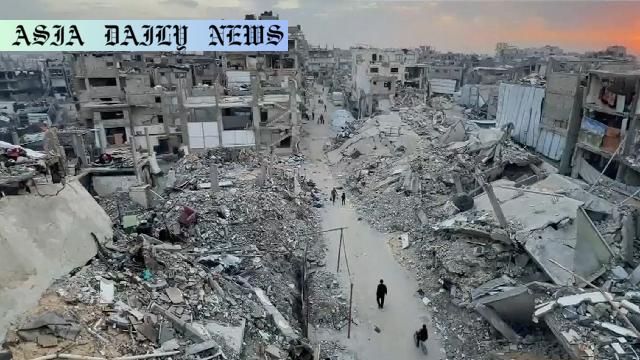Electricity supply cut off to Gaza, significantly impacting sanitation and raising humanitarian implications amid escalating tensions.
- Israel halted electricity supply to Gaza amid talks breakdown with Hamas.
- Hamas condemned the action as ‘collective punishment’ and a war crime.
- The suspension will worsen sanitation and humanitarian conditions in Gaza.
- Qatar mediates new talks, involving the US, seeking a resolution.

Introduction to the Electricity Crisis in Gaza
The ongoing discord between Israel and Hamas has escalated to a new crisis, as Israel’s decision to immediately cut off electricity supply to the Gaza Strip creates grave humanitarian repercussions. Announced on Sunday by Israeli Energy Minister Eli Cohen, the move comes amid stalling ceasefire agreements and rising tensions regarding how to transition to the next phase. This development has been met with sharp criticism from Hamas, with the organization labeling it as ‘collective punishment’ and accusing Israel of committing war crimes. The implications of this electricity suspension extend far beyond politics, pushing Gaza deeper into a dire humanitarian crisis.
Impact on Sanitation and Public Services
The electricity cut will critically affect essential facilities, including wastewater treatment plants, resulting in a looming risk of severe sanitation crises. Reports from Palestinian media highlight that without access to a reliable power source, sewage treatment operations come to a halt, leading to water contamination and an increase in water-borne illnesses. Coupled with Gaza’s already strained healthcare resources and poor living conditions, these developments threaten to spiral into widespread health disasters, particularly affecting children and vulnerable groups.
The Political Context and Deadlocked Negotiations
Israel’s action comes amidst its refusal to proceed into the second phase of the ceasefire process with Hamas. While the initial six-week ceasefire phase brought temporary relief, Hamas is now demanding the complete withdrawal of Israeli forces and an end to hostilities as part of the next step. Israeli officials, however, have expressed hesitation in opening negotiations, instead taking a more hardline stance, including halting essential services to Gaza. Meanwhile, Qatar is playing a significant mediatory role, hosting discussions between the involved parties, with the U.S. also actively pressing for solutions, such as the release of hostages held by Hamas.
Humanitarian Concerns and International Reactions
Humanitarian voices from across the globe are raising alarms over the impact of these measures on the civilian population in Gaza. Restricting access to electricity not only hinders critical life-saving infrastructure but also exacerbates the living conditions in an already blockaded territory. Prominent human rights organizations have criticized the electricity cut as an inhumane and unacceptable collective punishment strategy. With no immediate resolution in sight, the international community has called for urgent reinstatement of essential services while advocating for resumed diplomacy to foster peace and stability in the region.
Prospects for Resolution
While the situation presently appears bleak, there are efforts to revive negotiations. Both Israeli and U.S. delegations are expected to join discussions in Qatar to find pathways to advance the ceasefire framework. While the mediators face significant challenges, particularly with the entrenched positions of both parties, there is hope that international involvement could lead to constructive dialogue. The resolution of the electricity crisis is seen as central to alleviating the worsening humanitarian conditions in Gaza and fostering trust to advance towards long-lasting peace in the region.



Commentary
The Complexity of Humanitarian Issues
The sudden cut in electricity supply to Gaza highlights the complexities and devastating consequences of entrenched political disagreements. This decision, taken amidst an already strained ceasefire process, underscores how innocent civilians are often the primary victims of geopolitical conflicts. Families in Gaza, already enduring the repercussions of blockaded resources, now face additional adversities with their access to clean water, proper sanitation, and healthcare facilities severely impacted.
The Role of International Actors
International actors like the U.S. and Qatar have a critical role to play in navigating these choppy waters. While it is commendable that mediatory talks are ongoing, one cannot ignore the urgency that the worsening humanitarian crisis demands. With mounting crises related to healthcare, sanitation, and infrastructure resilience, it is imperative that these discussions prioritize the cessation of punitive actions targeting vital services. Such moves are not merely ethical imperatives but strategic avenues to build confidence for long-term agreements.
Focus on Sustainable Solutions
Looking ahead, it is clear the current approach to addressing disputes is unsustainable, leaving the predicament to perpetuate cycles of conflict and desperation. Sustainable peace cannot be built through collective punishment but through dialogue, trust-building measures, and addressing historical grievances. Solutions that prioritize the well-being of civilian populations might also help foster goodwill and set the stage for meaningful peace negotiations. This electricity crisis is a stark reminder of how easy it is to escalate harm but how complex it is to restore equity and justice.